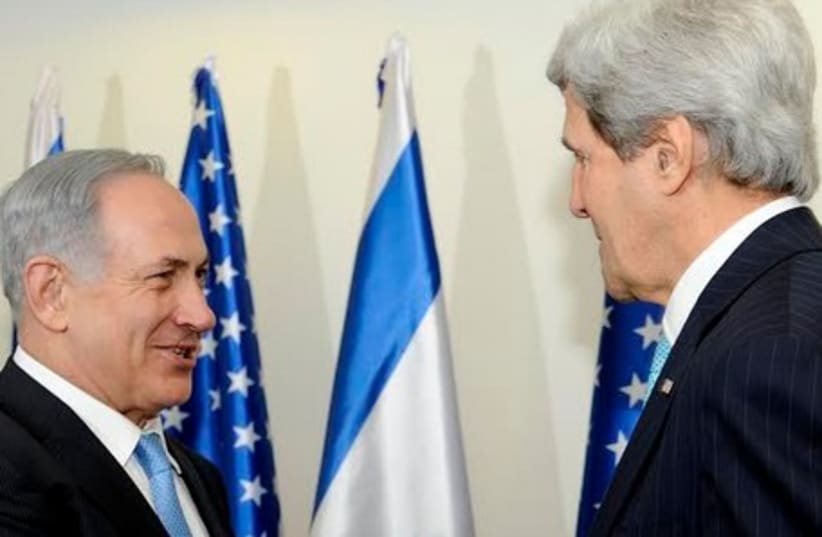US Secretary of State John Kerry met in Jerusalem Monday evening and again on Tuesday morning with Prime Minister Binyamin Netanyahu, amid reports the US may release Israeli spy Jonathan Pollard by mid-April as part of a wider package designed to resuscitate the negotiations.After his meeting with Netanyahu on Tuesday morning, Kerry was not scheduled to meet with Palestinian Authority President Mahmoud Abbas, and he was set to travel back to Brussels for meetings.The US Secretary of State will likely return to Israel in the coming days.
Reuters, citing sources close to the negotiations, said that under the plan Israel would go ahead with the release of the fourth group of Palestinian security prisoners it agreed to release under the framework that led to a renewal of talks last July.In addition, the sources were quoted as saying that Israel would agree to release another larger group of prisoners, and the peace talks would be extended past the April 29 deadline.Israeli officials would not discuss any details of what was under discussion. In Washington, White House spokesman Jay Carney said he had no update on Pollard. Nevertheless, there is a sense among some dealing with the issue that this time the reports of a deal that would include Pollard are more serious than in the past.Kerry interrupted his scheduled travels in Europe for the second time in a week to rush to the region and salvage talks in a crisis since Israel missed the March 29 deadline set to release the final batch of prisoners.Kerry was scheduled to travel to Ramallah late Monday night following his meeting with Netanyahu to meet with Abbas. It was not immediately clear whether there would be follow up talks on Tuesday. Kerry was originally scheduled to attend a NATO ministerial meeting in Brussels on Tuesday and Wednesday.Prior to the meeting in Ramallah, Abbas chaired a meeting of top PLO and Fatah officials to discuss the developments surrounding the peace talks and the crisis over the prisoners.State Department spokeswoman Jen Psaki said the US negotiating team has been on the ground to "help the sides agree to a path forward." US Middle East envoy Martin Indyk and his team have held intensive talks with both sides over the last week trying to figure out a way out of the current stalemate.Highly placed Israeli officials familiar with the negotiations said that Israel will release the final batch of 26 prisoners if it knows that the talks will move forward. He said that the talks were focused on seeing whether it is possible to reach an understanding that would make possible the continuation of talks.The source emphasized, however, that this "understanding" was not the US framework document that was discussed in the past that would serve as a basis for continued talks. The sides could not agree on that document.Kerry, according to the source, is working on a way to keep the parties engaged beyond next month's deadline.The source said that if it became clear that the process was ending, and that the Palestinians would go to international forums and wage diplomatic war against Israel once the final batch of prisoners was released, then there would be no reason to go ahead with that release.PA officials said that Kerry was trying to persuade Abbas to agree to an extension of the talks. One official said he did not rule out the possibility that Abbas would agree to the extension of the talks, but without linking it to the release of the prisoners."The prisoners should have been released a few days ago in accordance with understandings reached with Israel and the Palestinian Authority before the resumption of the peace talks several months ago," the official said. "Any attempt to create a linkage between the release of the prisoners and the extension of the talks is an act of blackmail."Even if Kerry does get the Palestinians to agree to continue the talks, and as a result Israel does release a final batch of Palestinians convicted of terrorist acts prior to the 1993 Oslo accords, it remains unclear whether Israel would Israeli Arabs in that list.Although the Palestinians claim that Kerry led them to believe that 14 Israeli Arabs would be included, Israel – even according to senior US officials – made no commitment last July to include Israeli Arabs in the prisoner releases. This, according to some speculation, is where Pollard might come into play, with the US releasing him in exchange for Israel agreeing to release Israeli Arabs.Any decision to release Israeli Arabs needs to go back to the cabinet for approval. The release of Pollard would make such approval likely, whereas without his release Netanyahu does not have a majority in the government for such a move.Khaled Abu Toameh and Reuters contributed to this report.Kerry leaves Israel after holding meetings with Netanyahu to save peace talks
Sources close to negotiation reporting Pollard may be released as part of deal whereby Israel would free fourth batch of prisoners, talks would continue.
